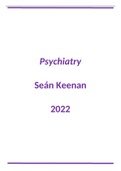Summary
Summary Psychiatry Notes
- Course
- Institution
Psychiatry notes detailing psychiatric conditions and treatment for medical school examinations. Notes made from multiple resources such as oxford handbook, question banks, university lectures and UK guidelines. Look at specialty section and content list for the summary contents of this file.
[Show more]



